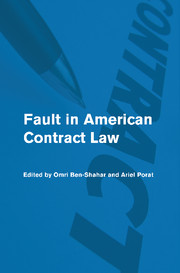Book contents
- Frontmatter
- Contents
- List of Contributors
- Preface
- Acknowledgment
- I THE CASE FOR STRICT LIABILITY
- II THE CASE FOR FAULT
- III BETWEEN STRICT LIABILITY AND FAULT
- IV WILLFUL BREACH
- V COMPARATIVE FAULT
- 14 A Comparative Fault Defense in Contract Law
- 15 Stipulated Damages, Superstrict Liability, and Mitigation in Contract Law
- 16 Creditor's Fault: In Search of a Comparative Frame
- VI THE MORALITY OF BREACH
- Case Index
- Subject Index
16 - Creditor's Fault: In Search of a Comparative Frame
Published online by Cambridge University Press: 10 November 2010
- Frontmatter
- Contents
- List of Contributors
- Preface
- Acknowledgment
- I THE CASE FOR STRICT LIABILITY
- II THE CASE FOR FAULT
- III BETWEEN STRICT LIABILITY AND FAULT
- IV WILLFUL BREACH
- V COMPARATIVE FAULT
- 14 A Comparative Fault Defense in Contract Law
- 15 Stipulated Damages, Superstrict Liability, and Mitigation in Contract Law
- 16 Creditor's Fault: In Search of a Comparative Frame
- VI THE MORALITY OF BREACH
- Case Index
- Subject Index
Summary
This chapter compares the role of the promisee's conduct in contractual relationships in U.S. and European legal systems. Different approaches to comparative negligence and mitigation are considered first, and then a more general analysis of doctrines dealing with the promisee's position in the contractual relationship and the role of cooperation is carried out. In this area, legal systems display significant divergences. Continental European systems recognize a strong role for comparative negligence and the duty to cooperate, while common law jurisdictions limit the scope of comparative negligence and the duty to cooperate while attributing a wider role to the duty to mitigate.
This chapter offers an “institutional” explanation to these divergences. The lack of comparative negligence in the United States, when considered along with the deployment of other forms of risk-sharing and apportionment of losses stemming from breach of contract, conforms to the idea that contract law is mainly directed at risk allocation. In European continental systems, the recognition of a general rule of comparative negligence and mitigation delineates a general principle based on the law of obligations, applicable to both contract and tort. Contractual relationships are generally characterized in these systems by a legal framework fostering a higher level of cooperation, including reallocation of risks between time of contract and time of performance.
Introduction
In this chapter, I compare the role of the creditor's (promisee's) conduct in contractual relationships in US and European legal systems.
- Type
- Chapter
- Information
- Fault in American Contract Law , pp. 237 - 254Publisher: Cambridge University PressPrint publication year: 2010



